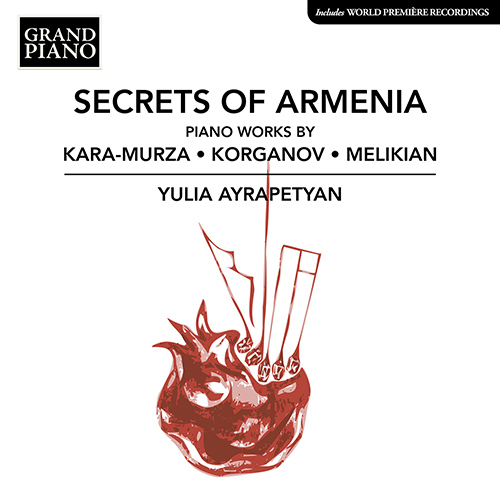
Genary Korganov (1858 - 1890)
Russian composer and pianist Genary Osipovich Korganov [Karganov] (born 30 April [12 May] 1858 in Kvareli, Georgia; died on 23 February [7 March] 1890 in Rostov-on-Don, Russia) was the son of Major General Osip Ivanovich Korganov (1811–1870).
Five of his brothers and sisters – Elena Teryan-Korganova, Nina Korganova (Dariali), Maria Korganova (Svetadze), Ivan (Hovhannes) and Konstantin Korganov – were vocalists. Genary Korganov began his musical education in Tiflis under the guidance of Eduard Epstein. He went on to study at the Leipzig Conservatory from 1874 to 1877 with Carl Reinecke, Salomon Jadassohn and E.F. Wenzel, and from 1877 to 1879 he improved his skills as a pianist at the St Petersburg Conservatory with Louis Brassin and Gustav Kross. Returning to Georgia in 1880 and settling in Tiflis, he entered the civil service, continuing to study composition in his spare time. He gave concerts in the city as a soloist, and was part of Mikhail Ippolitov-Ivanov’s inner circle. A music critic for newspapers in Tiflis, he also participated in the work of the Tiflis branch of the Imperial Russian Musical Society, and in 1889 was its delegate to St Petersburg as part of the celebrations commemorating Anton Rubinstein’s anniversary. He died on the return journey.
Korganov wrote a number of works for piano, such as the fantasia Bayati, Arabesques, Miniatures and Watercolours, and also wrote for voice, including the romances Serenade of Don Juan, Sharp Axe, with words by A.K. Tolstoy, and What in the silence of the nights, which sets a text by A.N. Maikov. Some of these enjoyed a certain popularity during the author’s lifetime, in particular Arthur Hartman’s violin arrangements of his works, which were published in the United States. His style incorporates both the influence of Rimsky-Korsakov and the use of local Transcaucasian melodies: according to the Armenian musicologist Sh. Apoyan, ‘Korganov’s works related to Armenian themes are of great value for the formation of Armenian piano music.’


 Grand Piano has gained a reputation for producing high quality recordings of rare keyboard gems. Dedicated to the exploration of undiscovered piano repertoire, the label specialises in complete cycles of piano works by many lesser-known composers, whose output might otherwise have remained unknown and unrecorded.
Grand Piano has gained a reputation for producing high quality recordings of rare keyboard gems. Dedicated to the exploration of undiscovered piano repertoire, the label specialises in complete cycles of piano works by many lesser-known composers, whose output might otherwise have remained unknown and unrecorded.






